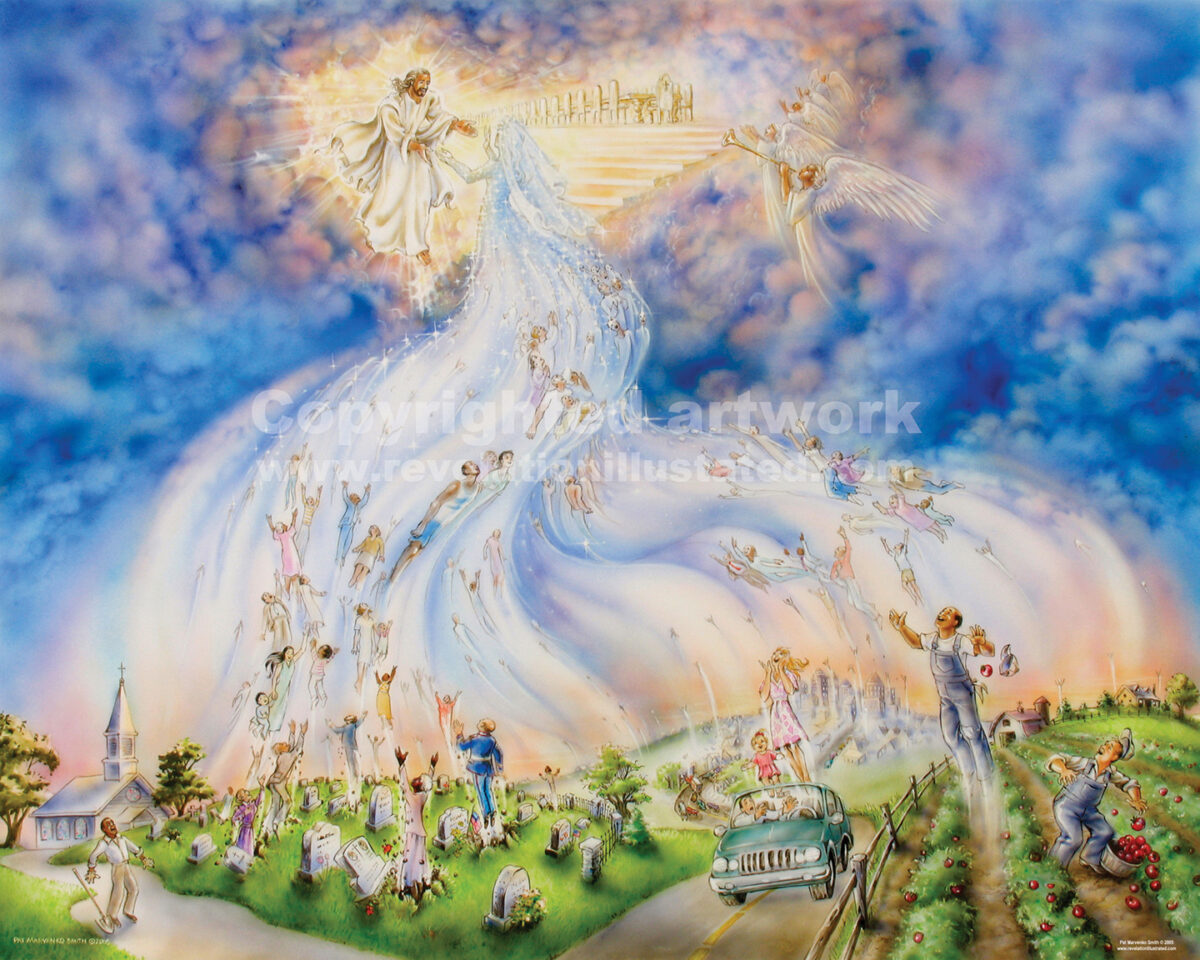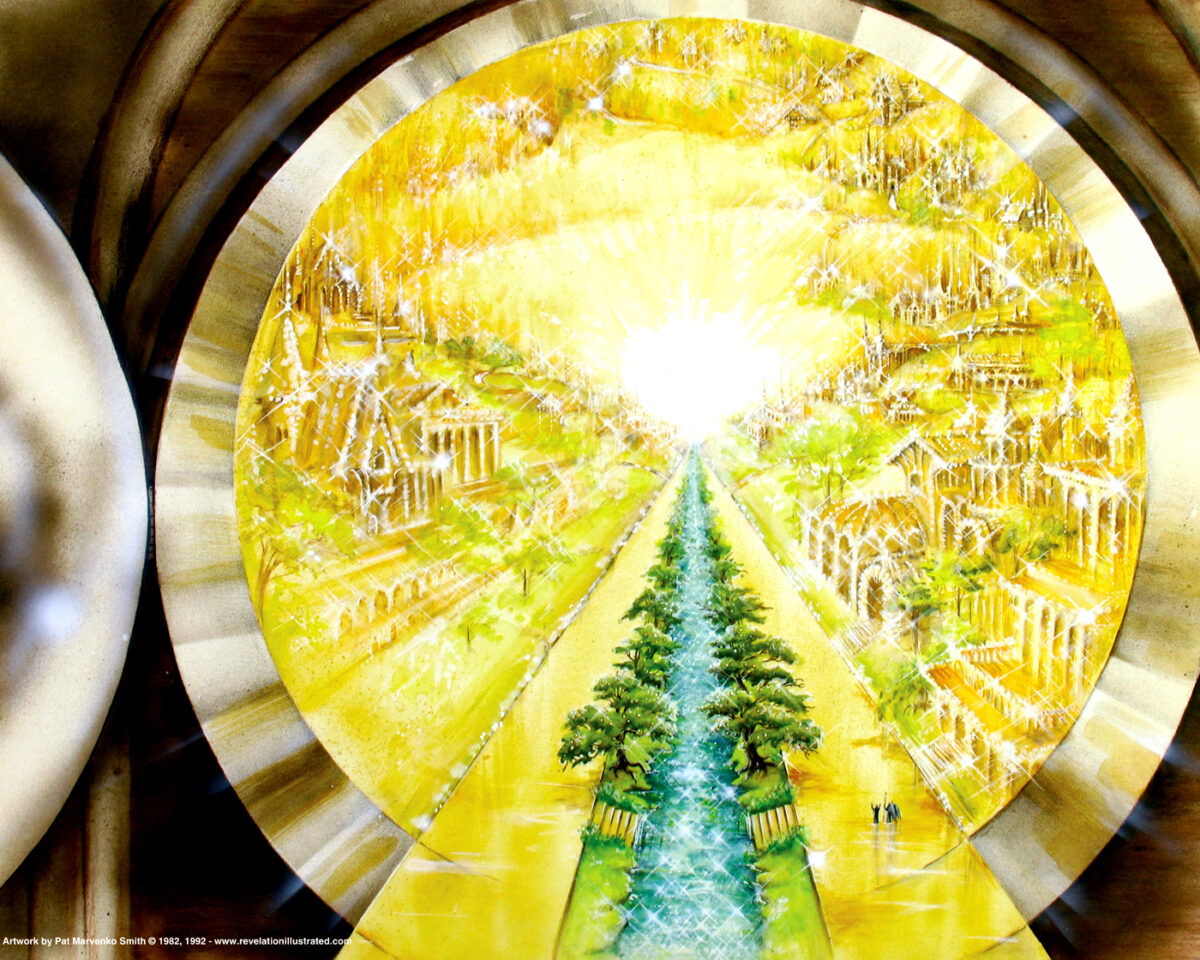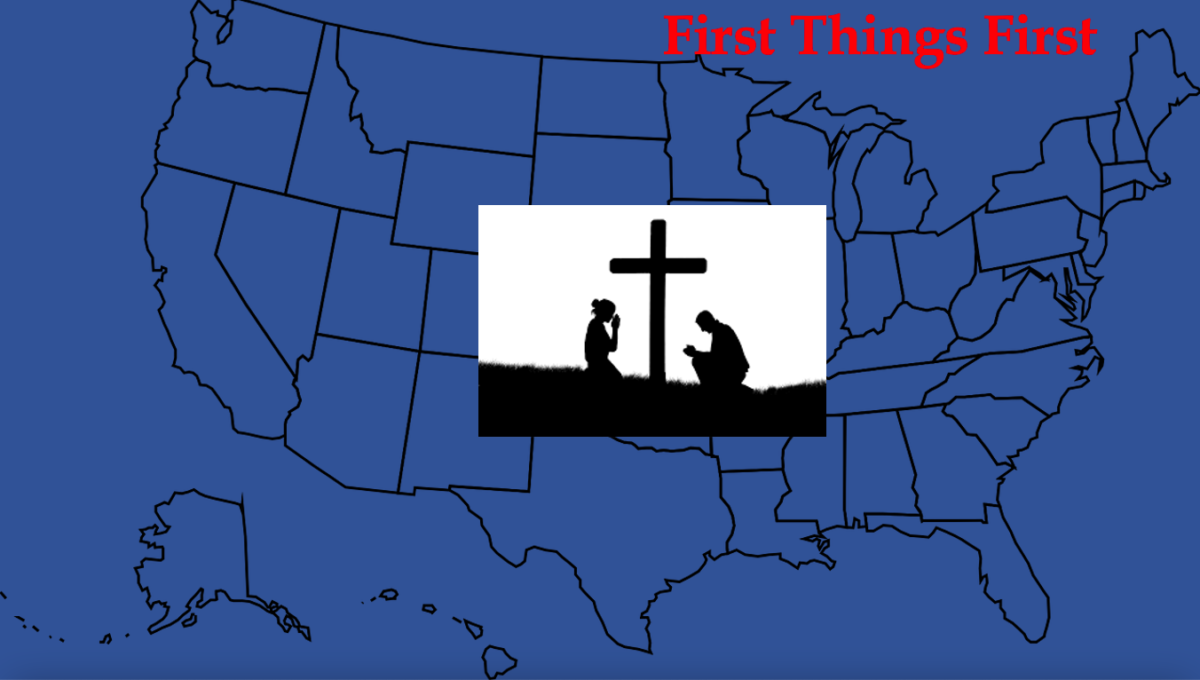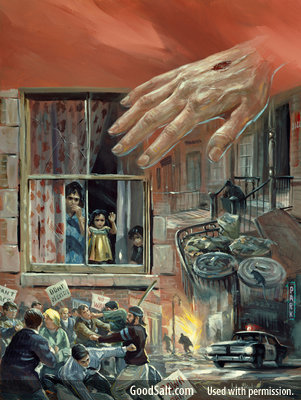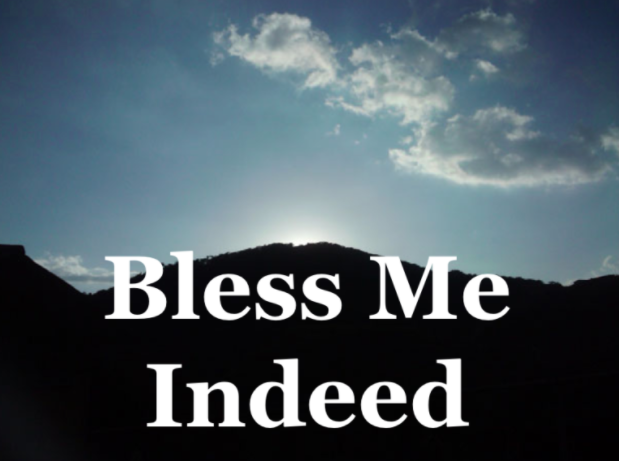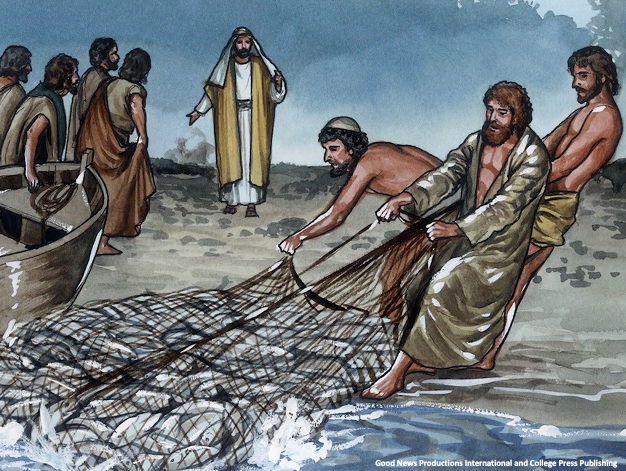“And he showed me a river of water of life, clear as crystal, proceeding from the throne of God and of the Lamb.” Revelation 22:1
After focusing primarily on the glorious external appearance and materials of the New Jerusalem on the new earth (21:1-27), the apostle John is directed by the angel to the interior of the New Jerusalem which will nourish and enrich the lives of God’s redeemed people (22:1-5). 1
McGee writes, “Up to this chapter, the New Jerusalem seems to be all mineral and no vegetable. Its appearance is as the dazzling display of a fabulous jewelry store; we wonder if there is no soft grass to sit upon, no green trees to enjoy, and no water to drink or food to eat. However, here are introduced the elements which add a rich softness to this city of elaborate beauty.” 2
“And he showed me a river of water of life, clear as crystal, proceeding from the throne of God and of the Lamb.” (Revelation 22:1). The phrase, “And he showed me” (kai edeixen moi) indicates a new aspect of the Celestial City that John’s guiding angel proceeds to show him. John sees a literal “river of water of life” that is “clear as crystal.” Since “there was no more sea” on the new earth (21:1), water will be supplied by this river. 3 This river is described as bright or “clear as crystal” because it was “shimmering like mountain water over the rocks” 4 and “sparkling” like a stream of unpolluted water. 5
In this section the apostle John is describing Paradise Restored which includes a river, the tree of life, fruit, and God’s presence (22:1-3). In the original Paradise, the Garden of Eden, there was a river that watered the garden (Genesis 2:10), a tree of life (Genesis 2:9b), fruit (Genesis 2:16; 3:2-3), and God’s presence (Genesis 2:15-25; 3:8). When Adam and Eve sinned against God by eating the forbidden fruit (Genesis 3:1-6), this original Paradise was lost. Adam and Eve were kicked out of the garden so they could not eat from the tree of life and live forever in unglorified bodies (Genesis 3:22-24). 6 “From that moment on, humanity began to decline into disharmony, disease, and eventual death.” 7
But now in the final stage of heaven, we see the original Paradise is restored. This life-giving and pristine river in the New Jerusalem flows “from the throne of God and of the Lamb” (22:1b). Notice that there is one “throne” that is shared by “God” the Father and God the Son (“of the Lamb”). 8 This is important to observe because it helps us understand what is meant in I Corinthians 15:24 which says, “Then comes the end, when He delivers the kingdom to God the Father, when He puts an end to all rule and all authority and power.” When the Lord Jesus “delivers the kingdom to God the Father,“ it does not mean Christ’s reign on the throne ceases, but that it will change its character. Christ is King of kings and Lord of lords forever. 9
This river that flows from God’s throne suggests not only physical refreshment for God’s people throughout eternity, but also everlasting enjoyment of God and His eternal life flowing to His people as well. We were told in Revelation 7, “15 Therefore they are before the throne of God, and serve Him day and night in His temple. And He who sits on the throne will dwell among them. 16 They shall neither hunger anymore nor thirst anymore; the sun shall not strike them, nor any heat; 17 for the Lamb who is in the midst of the throne will shepherd them and lead them to fountains of the water of life. And God will wipe away every tear from their eyes.” (7:15-17). Throughout eternity, the Lamb of God will be the source of experiencing and enjoying eternal life or “the water of life” (21:6; 22:1, 17; cf. John 4:10, 14; 7:37-39; I John 5:20). The water that flows from God’s throne in the New Jerusalem will cause the tree of life to grow and produce different fruit each each month (22:1-2). Both the fruit and the water will enhance the lives of those who consume them. 10
Alcorn adds, “Notice that the source of this powerful stream is the throne of God, occupied by the Lamb. He’s the source of all natural beauties and wonders. They derive their beauty from the Artist. The great river reflects His thirst-quenching, need-satisfying nature. He always meets His people’s needs and fulfills their longings.
“On the New Earth, we won’t have to leave the city to find natural beauty. It will be incorporated into the city, with the river of life as its source. The river flows down the city’s main street. Likely it has countless tributaries flowing throughout the rest of the city. Can you picture people talking and laughing beside this river, sticking their hands and faces down into the water and drinking? This fully accessible natural wonder on the city’s main street is amazing – something that would be featured in any travel brochure.” 11
“In the middle of its street, and on either side of the river, was the tree of life, which bore twelve fruits, each tree yielding its fruit every month. The leaves of the tree were for the healing of the nations.” (Revelation 22:2). This life-giving river flowing from God’s throne runs down “the middle of” the New Jerusalem’s very broad “street.” Each “side of the river” is lined with “the tree of life,” which we were told earlier is located “in the midst of the Paradise of God” which is the New Jerusalem (Revelation 2:7). 12
These trees lining the riverbank will bear “twelve” different “fruits, each tree yielding its fruit every month.” While most fruit trees on the current earth only bear fruit a few months of the year at most, these trees will produce fruit all year long. 13
Notice also that there will be a sense of time in heaven. The Bible says each of the trees will produce fruit “every month.” Many people think there will be no sense of time in God’s heaven. A theologian argued, “What a relief and what joy to know that in heaven there will be no more time.” 14 Someone else wrote, “Heaven will be a place where time will stand still.” 15
The book of Revelation contains many other references to time in heaven. The descriptions of worship in heaven include successive actions, such as falling down at God’s throne and casting crowns before Him “whenever” the living creatures give glory and honor and thanks to Him who sits on the throne (4:9-11). There is a sequence of events; things happen one after the other, not all at once. Martyrs in heaven are told to “rest a little longer” when they asked “How long” before God would avenge their deaths (6:10-11). Believers in heaven could not ask “how long” or be told to “rest a little longer” unless time passes in heaven. God’s people in heaven “serve Him day and night in His temple” (7:15). Revelation 8:1 says, “There was silence in heaven for about half an hour.” The inhabitants of heaven sing (5:9-12) which requires a sense of time. 16 “Meter, tempo, and rests are all essential components of music, and each is time related. Certain notes are held longer than others. Songs have a beginning, middle, and end. That means they take place in time.” 17
“How can Scripture be any more clear about time in Heaven? (Right down to silence in Heaven for half an hour.) To say we’ll exist outside of time is like saying we’ll know everything. It confuses eternity with infinity. We’ll live for eternity as finite beings. God can accommodate to us by putting Himself into time, but we can’t accommodate to Him by becoming timeless. It’s not in us to do so because we’re not God.” 18
Alcorn astutely observes, “People imagine time is an enemy because the clock seems to move so slowly when we’re having a root canal and so quickly when we’re doing what we love. But time isn’t the problem, the Curse is. Time isn’t the enemy, death is (I Corinthians 15:26). Time predated sin and the Curse. When the Curse is lifted, time will remain. Without the Curse, time will never work against us. We won’t run out of it. Time will bring gain, not loss. The passing of time will no longer threaten us. It will bring new adventures without a sense of loss for what must end.
“We’ll live with time, no longer under its pressure. When we see God face-to-face, time will pass, but we’ll be lost in Him. We’ll be busy exploring His universe, working on projects, fellowshipping with Him and each other, listening to and telling great stories. We’ll delight in time because it’s part of what God calls ‘very good.’ It’s a dimension in which we’ll enjoy God.
“When we say good-bye in Heaven, we’ll know people won’t die before we see them next. Time will no longer be an hourglass in which the sands go from a limited past to a limited future. Our future will be unlimited. We’ll no longer have to ‘number our days’ (Psalm 90:132) or redeem the time, for time won’t be a diminishing resource about to end.” 19
Since consumption of this fruit from the tree of life is an eternal reward, only overcoming believers – those who remained faithful to Christ to the end – will have the right to eat this fruit (2:7; cf. 2:10, 25-27; 22:12,14). 20 This fruit will give life-enhancing properties which will give overcoming believers additional energy or capacity to fulfill their responsibilities, including ruling on the new earth.
“It will reward those who overcome with a special privilege, an enhanced intimacy with God. The original tree of life would have provided immortality on earth in mankind’s natural bodies had Adam not sinned and been expelled (Genesis 3:22). This future tree of life will provide an enhanced experience of life in the new heavens and the new earth.” 21
Since the tree of life will produce fruit monthly throughout all eternity, “it seems possible… to understand participation in the tree of life and eating of this monthly fruit as a picture of the regular experience of fellowshipping with God. It is inconceivable that a Christian, in whom eternal life dwells, must continually eat from a tree to obtain final entrance into heaven or maintain his presence there. Therefore, eating of the tree of life cannot refer to regeneration.
“It is impossible that the tree of life refers to final entrance into heaven. Why? Because we are told in Revelation 2:5 that the condition for obtaining the right to eat of this tree is based upon ‘doing,’ that is, on works. Final salvation comes to us by faith alone apart from works. In Revelation 22:19, Jesus says that if anyone takes away from the words of the prophecy, ‘God will take away his portion (Gr meros) from the tree of life and from the city.’” 22
Marty Causley notes, “Obviously one cannot lose something one does not have… Genuine believers are in danger of losing their right to this tree; unbelievers have no right to this tree to lose.” 23
Barnhouse correctly states, “Some have said that eating from the tree of life was the equivalent of receiving eternal life, but this is most evidently a false interpretation. Eternal life is the prerequisite for membership in the true Church. Eating of the tree of life is a reward that shall be given to the overcomer in addition to his salvation…. He receives over and above his entrance into eternal life, a place in the Heavens in the midst of the paradise of God.” 24
John also says, “The leaves of the tree were for the healing of the nations” (21:2b). An additional function of the tree of life is for its “leaves” to provide “healing of the nations.” Keep in mind that “the nations” outside the New Jerusalem consist of believers from before and after the Church Age, some of whom will not have resurrected or glorified bodies. These will be sinless believers, much like Adam and Eve before they sinned, who descended from infants and children that survived the Tribulation period. 25 Even though there will be no more disease or death on the new earth because of sin, it may still be possible for these people who do not have glorified resurrected bodies to be injured or hurt. The leaves of the tree of life will bring healing and restoration to these people.
The Greek word for “healing” (therepeia) means “health-giving” and is where the English word “therapeutic” is derived from. 26 Hence, it is possible that these leaves will enhance the well being of all believers on the new earth in some way.
Next John informs us, “And there shall be no more curse.” (Revelation 22:3a). To help us understand what this means, think about what the earth would have been like if Adam and Eve had not sinned. They would have been fruitful and multiplied and filled the earth with billions of people since there would have been no death (Genesis 1:26-28). Eternity would have taken place on a glorious earth that was free from sin and its consequences. 27
If Adam and Eve had not sinned, there would have been no “curse” on the ground (Genesis 3:16-19). Adam and his descendants would have enjoyed satisfying caretaking of the earth. There would have been no “thorns and thistles.” Imagine not having to toil or sweat trying to remove unwanted plants (weeds)! No one would have returned “to the ground” in death.
Had Adam and Eve not sinned there would also have been no curse (Genesis 3:16) on conception (menstrual cycle) and childbirth so women could have conceived and eventually given birth to children without the pain and discomfort of the curse (cf. Isaiah 65:17-23).
The point is this earth would be where humankind would have lived eternally if Adam and Eve had not sinned. 28 Certainly, it would be much better than this current earth. This planet has changed drastically since Noah’s flood. But if the first man and woman had not disobeyed God, this earth would be perfect.
God is telling us that the new earth and the New Jerusalem will be like the Garden of Eden before the Fall (Genesis 2) revisited with the river of life providing refreshment for all of God’s people and the tree of life providing special enhancement for faithful believers to rule with Christ (22:1-2; cf. 2:7, 25-27; 3:12, 21; 22:12, 14).
Revelation 22:1-3a shows that what Genesis 3:8 anticipated will be realized on the new earth – walking with the Lord Jesus in the cool of the day in the garden. The Lamb, the Lord Jesus Christ, “will live with us forever, but not on a fallen earth, but a new and unfallen earth.” 29 An earth that “will be free from death, sin, disease, a ground that fights us, wild animals, pests, etc.” 30 This is going to be a spectacular place to live forever!
Do you want the New Jerusalem and new earth to be your future home? Listen to what Jesus said on the last day of the Feast of Tabernacles during His earthly ministry: “37 If anyone thirsts, let him come to Me and drink. 38 He who believes in Me, as the Scripture has said, out of his heart will flow rivers of living water.” (John 7:37-38). Only thirsty people drink. God has created us with a built-in need for Him. We are all born with a thirst for God—a longing to know God. For some, there is a deep thirst for significance. They want to feel like they are important and belong. That they are somebody. People whom society overlooks – those who are not wealthy, or handsome, or have strong personalities – thirst to be regarded as important. Some are looking for power – the ability to accomplish things. Jesus says to such, “If that is what you want, come to Me. Enter a personal relationship with Me,” Jesus says, “And your thirst for power and significance will be satisfied forever.”
Have you ever really been thirsty? When you are thirsty, there is not much else you can think about. When you are thirsty, you cannot get it out of your mind. That is what Jesus means. If you feel yourself driven, wanting something, restless and thirsty and longing for satisfaction, then His invitation is, “If anyone thirsts, let him come to Me and drink.” Regardless of your background, color, culture, education, intelligence, past, or social status, Jesus says to come to Him for eternal satisfaction. It is free. You don’t have to pay a cent. You simply come to Christ as you are.
The way to come to Christ is by faith alone apart from any good works. Jesus said, “He who believes in Me, as the Scripture has said, out of his heart will flow rivers of living water.” (John 7:38). To “believe” in Jesus means to be convinced that He is speaking the truth here and is therefore trustworthy. And then trust Him for your eternal destiny.
Years ago, three men were fishing on the Broadback River in northern Quebec. A violent storm arose, and gale force winds overturned their canoe. The men knew they couldn’t save themselves. They noticed the large ice chest that had been in the canoe now floating on the water. They pulled the ice chest underneath them, rested their weight upon it and trusted it to save them. It did.
What Jesus is saying is we are to come to Him just as we are – as sinners, understanding that He died in our place to take the punishment for all our sins and rose again, so that all we must do is believe in Him alone for His gift of salvation. The moment a person believes in Christ alone for everlasting life, “as the Scripture has said, out of his heart will flow rivers of living water.”
What “Scripture” is Jesus thinking of? I agree with Hodges who argues that it refers to Ezekiel’s vision of the future Millennial Temple in Ezekiel 47. 31 “Then he brought me back to the door of the temple; and there was water, flowing from under the threshold of the temple toward the east…south of the altar… it was a river that I could not cross; for the water was too deep… And it shall be that every living thing that moves, wherever the rivers go, will live” (Ezekiel 47:1, 5, 9). Ezekiel is talking about the Temple of God in the future thousand-year reign of Christ on earth.
The waters of Ezekiel’s prophecy have similar properties as the rivers Jesus speaks of, “And it shall be that every living thing that moves, wherever the rivers go, will live.” (Ezekiel 47:9). Those waters are properly described as living waters. This will be a life-giving river that flows from the Temple in the future Millennial Kingdom that will bring blessings to all it reaches.
If the Millennial Temple was to become the source of living, healing waters, could the destiny of those who believe in Christ be any different? Jesus tells us that when we come to Him as we are and believe in Him for His gift of eternal life, out of our innermost being will flow “rivers,” not just a river, of living water. The great thing about what Jesus offers is that it will never run dry. We will always have more than we need. When we are filled with the water Jesus offers, it does not stop with us. It gushes out of us! It keeps coming and touches those that we touch. We become, pipes, so to speak – pipes for Jesus – that in effect, allow Christ’s living water to flow through us to others. We are former thirsty people who now show thirsty people how to get a drink. God wants these rivers of living water to flow out of our lives and bless others.
When we come to Jesus, and He more than satisfies our spiritual thirst, we start to show concern for others. The satisfaction that we found in Christ leads us to reach out to needy people around us and to minister to them. Why not be a pipe for Jesus and let His blessings flow through you as you step out in faith to share the gospel with those who don’t have Christ in their lives? Be the channel through which the unsaved can discover how much God loves them and wants to bless them with eternal life. God saved you so that you can become a blessing to others as His rivers of living water flow through you to satisfy the needs of other people.
Those who believe in Christ will be able to experience the supreme blessing of Paradise on the new earth. On the new earth in the New Jerusalem, a river of living waters will flow from the throne of God the Father and God the Son, not from a temple. God will then reside with His people on the new earth forever and we will experience a new earth that is totally free from the Curse.
Prayer: Gracious Lord Jesus, thank You so much for this incredible description of our future home in the New Jerusalem on the new earth. This experience will be much like the Garden of Eden before Adam and Eve sinned. There will be a river, a tree of life, fruit, and most importantly – You! We will get to experience what Genesis 3:8 anticipated – walking with You in the cool of the day in the garden. Thank You for reminding us that the fruit of the tree of life is an eternal reward for those who remain faithful to You to the end of their lives on this earth. Please grant us the grace to faithfully serve You now so we can experience in the New Jerusalem this life-enhancing fruit and a deeper intimacy with You. And may each of us who believe in You be the channel through which the unsaved can discover how much You love them and want to bless them with eternal life. In Your matchless name we pray, Lord Jesus. Amen.
ENDNOTES:
1. Tom Constable, Notes on Revelation, 2017 Edition, pg. 246.
2. Ibid., cites J. Vernon McGee, Thru the Bible with J. Vernon McGee, Vol. 5 (Pasadena, CA: Thru The Bible Radio; and Nashville: Thomas Nelson, Inc., 1983), pg. 1075.
3. Tony Evans, CSB Bible by Holman, The Tony Evans Study Commentary (B & H Publishing Group, Kindle Edition 2019), pg. 2423.
4. Archibald Thomas Robertson, A. T. Robertson’s Word Pictures in the New Testament [with Bible and Strong’s Numbers Added!], 6 Volumes (E4 Group, 2014 Kindle Edition), Kindle Location 230548.
5. Constable, pg. 246.
6. Robert N. Wilkin, The Road to Reward: A Biblical Theology of Eternal Rewards Second Edition (Grace Evangelical Society, 2014 Kindle Edition), pg. 78.
7. Charles Swindoll, Insights on Revelation (Swindoll’s Living Insights New Testament Commentary Book 15, Tyndale House Publishers, Inc., 2014 Kindle Edition), pg. 392.
8. Evans, pg. 2423.
9. John F. Walvoord, The Bible Knowledge Commentary Epistles and Prophecy, Editors John F. Walvoord and Roy B. Zuck (David C. Cook, 2018 Kindle Edition), Kindle Location 6622.
10. Bob Vacendak; Robert Wilkin; J. Bond; Gary Derickson; Brad Doskocil; Zane Hodges; Dwight Hunt; Shawn Leach; The Grace New Testament Commentary: Revised Edition (Grace Evangelical Society, Kindle Edition, 2019), pp. 1526-1527, 1587.
11. Randy Alcorn, Heaven: A Comprehensive Guide to Everything the Bible Says About Our Eternal Home (Tyndale House Publishers, 2004 Kindle Edition), pg. 361.
12. Vacendak, pg. 1587.
13. Constable, pg. 247.
14. Alcorn, pg. 376 cites Rene Pache, The Future Life (Chicago: Moody, 1971), pg. 357.
15. Ibid., cites Salem Kirban, What is Heaven Like? (Huntingdon Valley, Pa.: Second Coming, 1991), pg. 35.
16. Alcorn, pp. 377-378.
17. Ibid., pg. 378.
18. Ibid.
19. Ibid., pp. 379-380.
20. Vacendak, pg. 1587; Joseph Dillow, Final Destiny: The Future Reign of The Servant Kings: Fourth Revised Edition (Grace Theology Press, 2018 Kindle Edition), pg. 678.
21. Dillow, pg. 679.
22. Ibid.
23. Ibid., cites Marty Cauley, The Outer Darkness 2 Vols. (Sylva, NC: Misthological Press, 1231 Monteith Branch Road, 2012), pg. 510.
24. Ibid., cites Donald Grey Barnhouse, God’s Last Word: Revelation; an Expository Commentary (Grand Rapids: Zondervan Publishing House, 1971), pp. 43-44. For a similar view see Richard R. Benedict, “The Use of Nikaō in the Letters to the Seven Churches of Revelation” (Th.M. thesis, Dallas Theological Seminary, 1966), pg. 11.
25. Vacendak, pg. 1586; cf. Evans, pg. 2423.
26. Walvoord, Kindle Location 6629 to 6633; Constable, pg. 247.
27. Wilkin, Road to Reward, pg. 94.
28. Ibid., pg. 95.
29. Ibid., pg. 96.
30. Ibid.
31. Zane C. Hodges, “Rivers of Living Water – John 7:37-39,” Bibliotheca Sacra 136:543 (July-September 1979), pp. 239-248.


